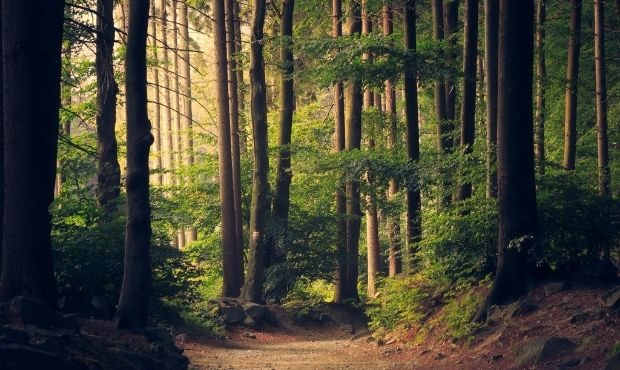New book says ‘Mother Trees’ care for their forest kin using an underground fungal network
Jul 19, 2021, 10:57 PM | Updated: Jul 22, 2021, 4:23 pm
Trees talk to each other. It’s true! Just ask Dr. Suzanna Simard, professor of forest ecology at the University of British Columbia and author of the new book, Finding the Mother Tree.
Through decades of research, Dr. Simard has determined there’s a huge, complex underground network of mycorrhizal fungi that connects the trees in a forest and allows them to speak to one another. They share important information for survival as well as nutrients. Her book focuses on Mother Trees, the old matriarchs of the forest that use this Internet-like fungi network, nicknamed the Wood Wide Web, to care for younger trees.
“Older trees are able to discern which seedlings are their own kin,” Dr. Simard reads from her book. “The old trees nurture the young ones and provide them food and water, just as we do with our own children. It is enough to make one pause, take a deep breath and contemplate the social nature of the forest and how this is critical for evolution. The fungal network appears to wire the trees for fitness. And more, these old trees are mothering their children.”
This underground fungi network also plays a big role when a tree is dying. The death of a Mother Tree can last decades and during that time she passes on her wisdom.
“This transmission of carbon, but also information, to neighboring trees is an important process in that dying process because it transmits information from the past to the future. These old trees will transmit information about their health and defense systems and even their genetic makeup to their kin or their offspring or other neighbors. It’s a long process; it’s a vital process, actually. We often ignore that process by harvesting dying trees and using them for wood when in fact those trees are playing an important role nurturing the next generation along.”
Dr. Simard started forming these hypotheses as a young woman working for the forest service in British Columbia. After they clear cut a forest, they’d plant new trees. But Dr. Simard noticed a low survival rate of those saplings and made it her mission to figure out why they weren’t thriving. The long belief held by the forest service was that trees competed with one another for survival.
“And I was coming along with this new research, saying: actually they collaborate, they work together to create a healthy ecosystem. This went against the grain of this industry that was supported by a lot of money. So there was a lot of backlash, there was a lot of pushback. Ignoring of the work still goes on. We still haven’t changed our forestry practices. We still clear cut our mother trees, we still get rid of the native plants, we still have not changed.”
Eventually she entered academia, where she could focus solely on scientific research to back up her claims. Dr. Simard’s TED talks on the topic have been viewed more than 10 million times and anthropomorphizing the trees into the roles of mothers and children is designed to get people more invested in the future of trees.
“I wanted the research to get into people’s hearts so that they would fight for these forests. If they understand forests as connected societies, very much like our own human societies, they’ll care more about this and fight for these last, remnant forests because they’ll know better about how essential they are for us as well.”
Listen to Rachel Belle’s James Beard Award nominated podcast, “Your Last Meal.” Follow @hellorachelbelle on Instagram!














